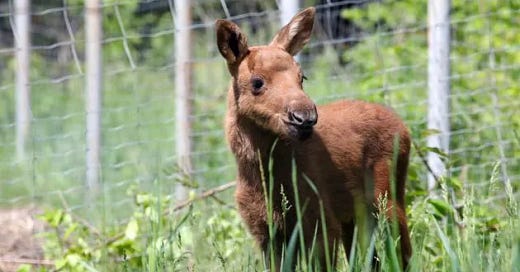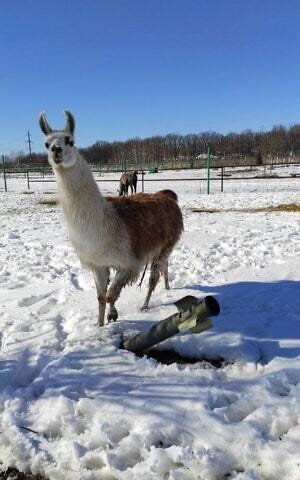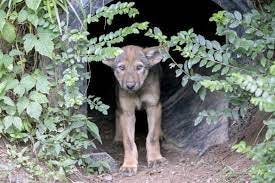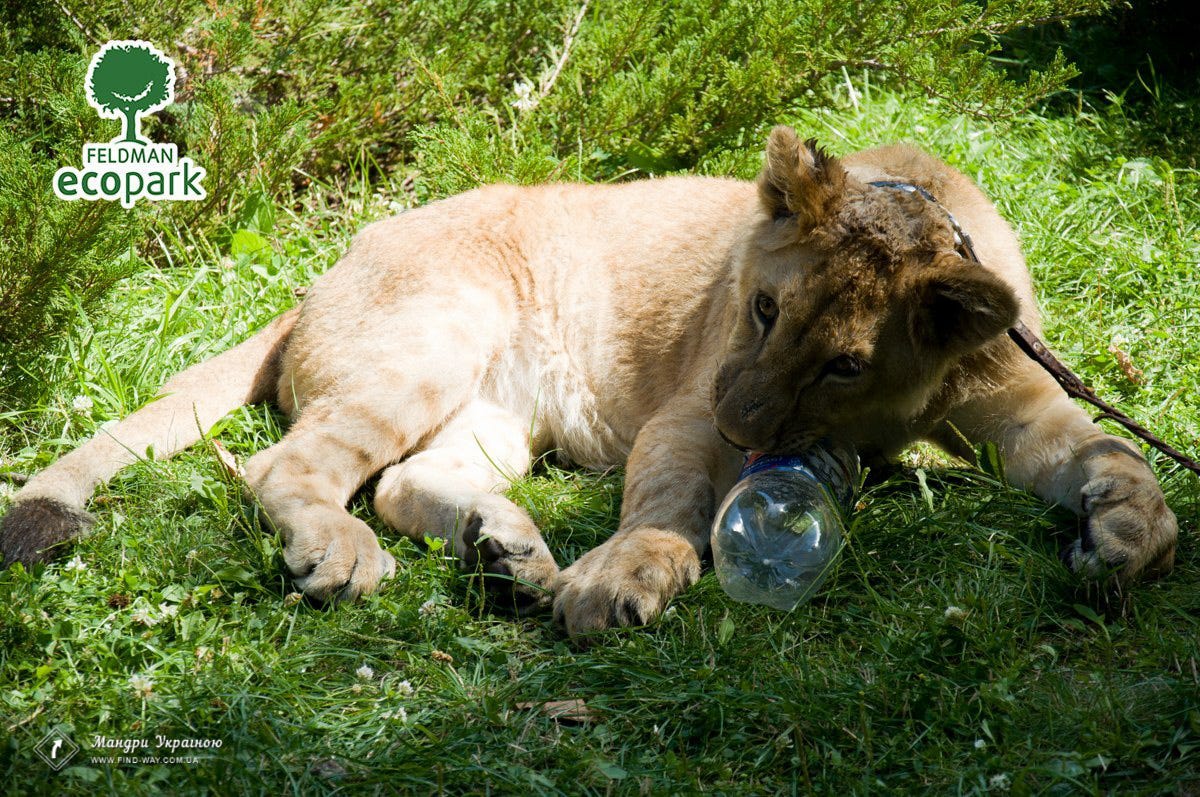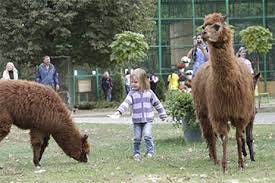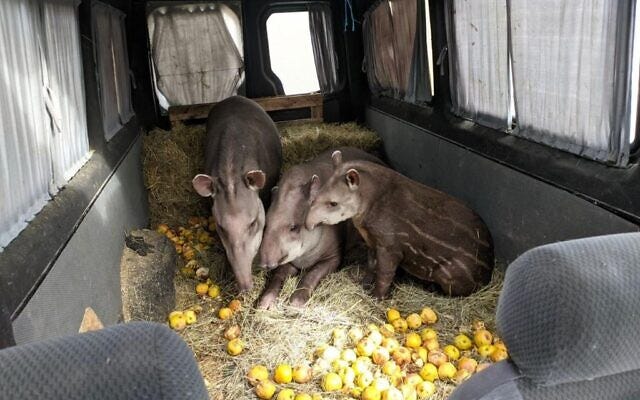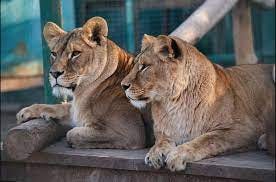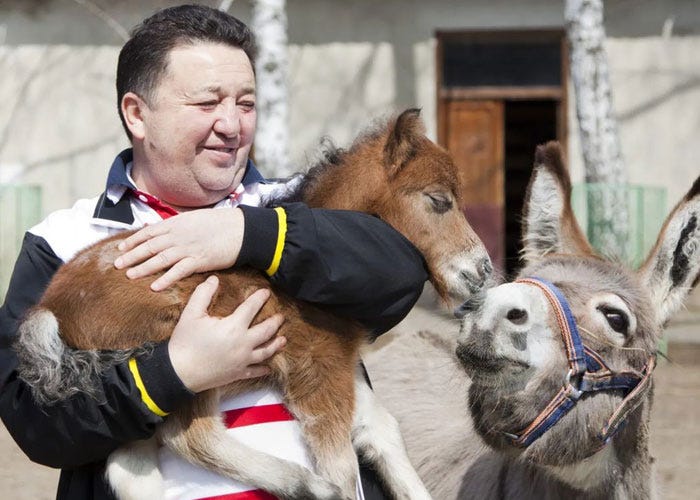I last wrote about this zoo in May of last year. Its founder, passionate animal lover Olexander Feldman, told me it had been shelled and bombed continuously since February. Hundreds of animals escaped to the woods nearby, including monkeys and parrots. Most were recovered, but escaped deer and red wolves were not. It was thought that those animals were still alive in the woods, along with non-zoo hedgehogs, squirrels, amphibians, and birds. Dozens of pelicans and swans that had been rehabbed at the park. and many wild ducks that stayed for the winter near “Swan” Lake, died from the explosion of a shell that fell in the lake.
Some hooved animals including antelope that could not be safely evacuated were released into the woods. They were joined by yaks and bulls that escaped there (and were later spotted alive) during an evacuation effort interrupted by mortar fire. Staff believed at the time that they and the hooved animals might survive, “unless the bombing continues.” Most zoo animal enclosures including those of big cats and bears were badly damaged. It was feared they would have to be killed in order to protect the public, if safe places for them to be moved could not be found.
Many of the remaining animals were so stressed from the bombing that special vet care was needed. Eventually most were taken to safe places with the help of other zoos, animal shelters, volunteers, and “thousands of concerned people around the world.” Still, limited ability to buy and deliver food made it hard to keep the animals fed.
I don’t have stats yet on which animals are still thought to be alive in the woods today, but the site France24.com reports that Kharkhiv is currently under attack regularly, and residents have no idea which area will be hit next. Meanwhile, I’d written recently to Mr. Feldman in January to check on him, the staff, and animals. He wrote back:
The first six months of the war were very difficult for Feldman Ecopark. It was bombed and shelled almost every day. As a result, the Ecopark was actually completely destroyed, but thanks to the heroism of our employees and volunteers, most of the animals were evacuated to safe places. Now they are temporarily located in different zoos.
We had the dead, both among people and among animals, a lot of destruction, but I do not want to focus on this now. All this is very difficult, but we do not lose faith in the best. In recent months, the territory of the Ecopark has not been shelled, and we are waiting for it to be cleared of mines in order to begin its restoration. I believe that with the help of our friends around the world, we will definitely restore the Ecopark and it will become even better than it was before the war.
But the path even to this point has been extraordinarily difficult. In an August 6th article in the Times of Israel, reporter Lazar Berman wrote that Feldman choked back tears as he faced a television camera, saying “Feldman Ecopark no longer exists.” He’d founded the park as a petting zoo for children in 2011, gradually bringing in over 5,000 animals and 300 species. Berman added, “The park — and all its festivals and activities — were always entirely free of charge. It maintained a particular orientation toward children, hosting animal therapy programs, a children’s theater and nature schools for kids. Then war came to Kharkiv.”
On Day 1 of the war five Russian shells expoded in the Ecopark, causing serious damage and killing some animals. The zoo closed but shelling continued. By March three employees had been killed, and so far a total of six staff and volunteers have died. Feldman tried desperately to find temporary shelter for the predator animals whose cages were damaged. Just a few hours after his public request for help, it came from both inside and outside Ukraine. Temporary homes were found for two lions, a jaguar, and a panther. The next day five more lions were evacuated. In the end, though, 100-150 animals were killed or had to be euthanized (I’ve seen both numbers.)
Speaking from an office in Kiev, Feldman told Berman, “Kharkiv is my home and it’s being destroyed right in front of my eyes.” According to Berman, “Though Russian forces briefly reached the city’s center, by mid-May they had been driven back toward the border. Still, the city continues to suffer from shelling, and destruction is widespread in civilian areas.” Feldman’s Kharkiv home was also struck. He doesn’t think he’s been personally targeted, but said, “If I had gone to sleep where I usually go to sleep in my bed, I would not be here now.”
Feldman doesn’t only care about animals. Berman says he helped nearby residents, using as hubs the zoo and other sites including Kharkiv’s Choral Synagogue. Feldman said his projects have provided over 540,000 food packages and 30,000 hot meals during the war. Groceries were bought and food cooked and offered to those in need. Berman writes that at the height of the Russian attacks the synagogue fed thousands every day.
Feldman told Berman, “What can I feel, when every day I see that Russians attack civilian objects, they attack schools, they attack kindergartens, they attack churches. It’s the most inhumane thing that can happen.”
Feldman recently launched the Feldman EcoPark Recovery Fund to help get the zoo and park open again. The plan is to remove mines and begin construction. The fund will also pay for maintenance of migrant animals, clearing, and providing safe conditions for the needed construction. Along with these plans, he wrote on the announcement page:
Right now, when the country is heroically fighting the consequences of enemy strikes, when Ukraine is returning to light, heat and water with the help of power engineers, rescuers and public utilities. At this incredibly difficult time, we are taking a decisive step towards restoring the park. We are not afraid of anyone and we know for sure that victory is on our side. Because we will never give up.
Destroyed, wounded, today’s Ecopark will be literally revived from the ashes. Because it was and remains the territory of love. To people, to animals, to nature – to everything that is priceless, that gives strength to live, believe and win. Ecopark is a real people’s park. Entrance to it after the restoration will forever remain free.
Today, in a difficult wartime, when there is a lot of pain around, humanity, kindness and willingness to help and support are the most valuable qualities. These qualities make us human – unconquered and free. Evil is always dependent and cowardly. We have always known that we have many friends. Thank you everyone.
Near the end of his interview with Feldman about the Russian invasion, Berman said Feldman seemed about to express another thought, but paused, then “suddenly “grabbed my forearm as his eyes teared up. He let out an involuntary sob, turned and rushed back into his office.”
To donate, go to https://feldman-ecopark.com/en/news/stvoreno-fond-vidnovlennya-feldman-ekopark/
To learn more about zoos in wartime, including how the London Zoo got through WWII, see “Ukraine’s Zoos: What’s Happening to All the Animals” (link is below).
Notes:
https://www.france24.com/en/europe/20230217-kharkiv-s-year-of-war-a-bomb-can-fall-on-your-home-any-time-%E2%80%93-and-your-life-is-over
https://www.timesofisrael.com/losing-beloved-zoo-ukrainian-jewish-leader-haunted-by-assault-on-his-city/
Other photos from site Feldman EcoPark, Kharkiv, Ukraine, Newsweek, Yahoo Finance, Species Unite,
https://www.discovermagazine.com/planet-earth/ukraines-zoos-what-is-happening-to-all-the-animals
